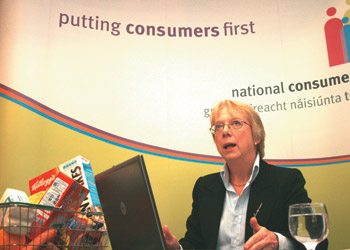Does the Irish retail market need more competition?

The NCA cry that there is room for another big grocery retailer in the Irish market may be a hit with consumers but would Ireland really appeal to a new entrant?
11 October 2010
 In August, Ann Fitzgerald, chief executive of the NCA, delivered a speech in which she gave a typically forthright assessment of the state of the grocery retail market in Ireland. Yes, prices had come down significantly – 14% between January 2009 and July this year. But the rate of decline was fast moderating and, she further noted, the prices of the big multiples were extremely closely aligned. When the NCA surveyed a basket of 87 goods purchased in Dunnes, Superquinn, SuperValu and Tesco, it found there was just €5.75, or 2.4%, between the cheapest and most expensive baskets. The difference was narrower still when baskets of 103 branded products purchased in Dunnes, Superquinn and Tesco were compared – just €1.14 or 0.4%. The market, she concluded, was returning to a “comfortable place” of unacceptably high margins and price-matching by three big players, which between them control over 70% of the Irish grocery retail market.
In August, Ann Fitzgerald, chief executive of the NCA, delivered a speech in which she gave a typically forthright assessment of the state of the grocery retail market in Ireland. Yes, prices had come down significantly – 14% between January 2009 and July this year. But the rate of decline was fast moderating and, she further noted, the prices of the big multiples were extremely closely aligned. When the NCA surveyed a basket of 87 goods purchased in Dunnes, Superquinn, SuperValu and Tesco, it found there was just €5.75, or 2.4%, between the cheapest and most expensive baskets. The difference was narrower still when baskets of 103 branded products purchased in Dunnes, Superquinn and Tesco were compared – just €1.14 or 0.4%. The market, she concluded, was returning to a “comfortable place” of unacceptably high margins and price-matching by three big players, which between them control over 70% of the Irish grocery retail market.
Bottom line: a new player was needed to come in that would shake up the status quo and restore “competitive pricing”.
The conclusions of the NCA prompt a number of key questions about the grocery retail environment in Ireland. First, against a background of effective retail saturation, is there really, as the NCA contends, scope for a new entrant to come into the Irish market? Second, if there is, who would the front-runners be? Third, how realistic is it that anyone would even want to enter the market given the economic backdrop? And finally, if Ireland is so attractive to international non-discount retailers, why is Tesco, which has been here since 1997, still the most recent new entrant?
Retail planning guidelines blocking new entrant
Taking the last of these questions first, although there are potentially many reasons why a new player would decide whether or not to enter a new market, it has long been argued by the NCA, among others, that the retail planning guidelines (RPGs) are a major reason why we have not seen more competition in the grocery retail market. In a recent submission to the Government in the context of the upcoming review of the guidelines, the NCA argued that the RPGs as they exist today are a barrier to competition in grocery retailing.
Speaking to ShelfLife, Marie Hurley, head of research and communications channels at the NCA, argues that the whole approach to planning in Ireland does not sit well with multinational grocery players’ approach to business.
“Multinational operators like certainty. They like to be able to write a plan, cost it and roll it out without undue impediment and without restrictions which in some cases can seem capricious or in some manner arbitrary. We feel there has been a degree of arbitrariness in the application of the planning guidelines, particularly in the way restrictions and limitations on floor space have been applied. That must have resulted in an environment of some uncertainty for anybody who might have been considering entry to the market.”
If the NCA is correct and the RPGs act as a significant barrier to competition, then the easing of those guidelines might well encourage new players into the market. But there are other reasons why such entrants may have been put off. The lack of suitable acquisition targets would be high on the list.
Acquisition most likely
A new entrant is not going to build a supermarket chain from scratch but rather acquire an existing grocery estate, such as Tesco did with Quinnsworth in 1997. But since the removal of Quinnsworth, who else is out there? SuperValu is a franchise of owner-managed stores, so that’s not a runner. Superquinn might be a target except for the fact that all but seven of its 23 stores are located in Dublin – this would rule it out in the mind of any suitor with true national ambitions. Which leaves Dunnes. Dunnes Stores is a very successful private, family-owned Irish firm. But would Margaret Heffernan and Frank Dunne – the brother-and-sister duo who run the retail giant – really sell out to the likes of an ASDA/Wal-Mart or a Sainsbury rather than bequeath it to the next generation of Dunne children?
Just as pertinently, would a Wal-Mart or a Sainsbury really be interested in acquiring a company that that is severely lacking in one respect: unlike Superquinn and Tesco, Dunnes is only rolling out its central distribution facility, a piece of infrastructure that in other countries is seen as a prerequisite for running a modern grocery retail business efficiently?
Irish market not too inviting at present
But assuming the perfect acquisition opportunity arose, even the most gung-ho international retailer might hesitate before investing in the Irish market at the present time.
Having technically emerged from recession earlier this year, the economy has started to contract again. Unemployment has trebled in two years – there are now 450,000 on the dole. The value of the total grocery market has declined by 5.7% in the year to 13 June 2010, dropping to under €9 billion for the previous 52 weeks. Consumer spending is likely to keep falling once the full effect of the doomsday budget of December is felt. In fact, spending will likely remain depressed for many months if not years to come as taxpayers collectively pay for the sins of the banks.
This is not the sort of spending outlook that any prospective entrant likes to see, especially one that will have a myriad of other investment opportunities around the UK and Europe to lay claim on its capital.
Too much competition already?
Moreover, the competitive landscape is hardly appealing. Before the boom, Ireland was undeveloped in grocery retail terms but today, by any measure, Ireland is extremely well stocked with retail outlets. As well as countless convenience units, there are about 140 Aldi and Lidls, 120-plus Tescos, 100-plus Dunnes Stores, 70 SuperValus and 20 Superquinns. Has saturation point been reached? Many consumers as well as those in the trade would feel it has.
The combination of planning constraints, paucity of acquisition targets, recession, and market saturation cannot but weigh heavily against the likelihood of a big new player entering the market.
But, despite all, there still are reasons why some overseas players may be tempted to make a move on the Republic. The first is that retail margins here, though a closely guarded trade secret, are known to be higher than in the UK. Tesco’s ‘Change for Good’ programme of 2009 which dragged Dunnes and Superquinn’s pricing down with it, has eroded these margins but the best guess from market-watchers is that these margins are still a couple of percentage points above the UK’s. Second, Ireland presents retailers operating in Northern Ireland with the opportunity to generate economies of scale by expanding their operations into the South.
Two possible entrants
Which brings us to our final question: who are the possible new entrants to the Irish market? There are only two UK-based grocery chains who have an established presence in Northern Ireland and who would therefore benefit (in theory at least) from expanding south: J Sainsbury and Asda/Wal-mart.
Needless to say, when contacted by ShelfLife, both companies were tightlipped about their plans. Sainsbury did not return telephone calls or respond to email messages while an Asda spokesperson at its Leeds HQ said the company “never comments on speculation”.
So, would they ever make the jump? Strange things happen in business. Were one of our existing retailers to go into meltdown and allow Asda or Sainsbury to get into the Irish market at a knockdown price, then it’s not to be ruled out. Should this not happen, however, the balance of probability is that we won’t see Asda, Sainsbury or any other big player adding the Republic to their list of operating countries. The NCA may not like it but the current “comfortable” competitive landscape is unlikely to change much any time soon.



 Print
Print






Fans 0
Followers